

Learning Styles Don't Exist. Pedagogy Versus Technology. VirtualClassrooms.10UseCases.pdf. ePrimer series. This E-Primer series places e-learning in a context of learning theory, institutional development, and instructional design.
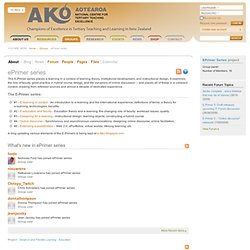
It examines the role of faculty, good practice in hybrid course design, and the dynamics of online discussion -- and places all of these in a coherent context, drawing from refereed sources and almost a decade of dedicated experience. Blog Archive » Viral Professional Development. Lately, I have been posting in other forums about Viral Professional Development (VPD).
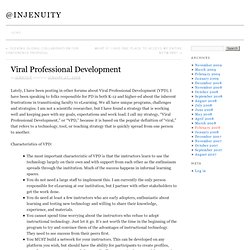
I have been speaking to folks responsible for PD in both K-12 and higher-ed about the inherent frustrations in transitioning faculty to eLearning. We all have unique programs, challenges and strategies. I am not a scientific researcher, but I have found a strategy that is working well and keeping pace with my goals, expectations and work load. I call my strategy, “Viral Professional Development,” or “VPD,” because it is based on the popular definition of “viral,” that refers to a technology, tool, or teaching strategy that is quickly spread from one person to another. Theory and Practice of Online Learning. Blackboard Guide for Tutors. A while ago I posted about a guide to Moodle that Joyce Seitzinger had created – “Moodle Tool Guide for Teachers“, and I am pleased to say it was well received and gained quite a lot of re-tweets and hits, both on my website and even more importantly on Joyce’s.
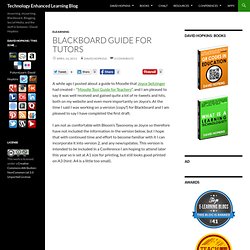
At the time I said I was working on a version (copy?) For Blackboard and I am pleased to say I have completed the first draft. I am not as comfortable with Bloom’s Taxonomy as Joyce so therefore have not included the information in the version below, but I hope that with continued time and effort to become familiar with it I can incorporate it into version 2, and any new/updates. Office of Instructional Consulting: IU School of Education. Nine principals for excellence in online teaching. Jim Henry Jeff Meadows Authors Jim Henry is an Assistant Professor in the Faculty of Education at the University of Lethbridge.
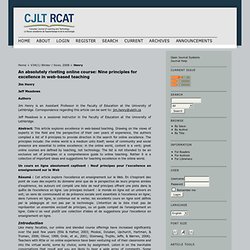
Correspondence regarding this article can be sent to: jim.henry@uleth.ca Jeff Meadows is a sessional instructor in the Faculty of Education at the University of Lethbridge. Abstract: This article explores excellence in web-based teaching. 'Open Teaching': When the World Is Welcome in the Online Classroom - Technology. By Marc Parry In his work as a professor, Stephen Downes used to feel that he was helping those who least needed it.
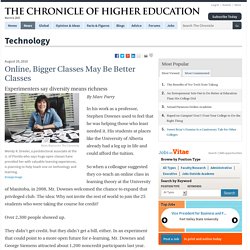
His students at places like the University of Alberta already had a leg up in life and could afford the tuition. So when a colleague suggested they co-teach an online class in learning theory at the University of Manitoba, in 2008, Mr. Downes welcomed the chance to expand that privileged club. The idea: Why not invite the rest of world to join the 25 students who were taking the course for credit? Over 2,300 people showed up. They didn't get credit, but they didn't get a bill, either. The Downes-Siemens course has become a landmark in the small but growing push toward "open teaching. " "We have to get away from this whole idea that universities own learning," says Alec V. Openness proponents contend that distance education often isolates students behind password-protected gates. Some open professors are finding, though, that exposure brings its own challenges. Openness vs. Online Discourse - e-Primer series.
Communication is at the very centre of education, so it’s not surprising that educators have rapidly adopted recent developments in ICT to improve the reach and effectiveness of their teaching.
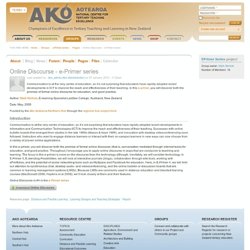
In this e-primer , you will discover both the promise of formal online discourse for education, and good practice. Author: Mark Nichols , E-learning Specialist Laidlaw College, Auckland, New Zealand Date: May, 2009 Funded by the Ako Aotearoa Northern Hub through the regional hub project fund . Introduction Communication is at the very centre of education, so it’s not surprising that educators have rapidly adopted recent developments in Information and Communication Technologies (ICT) to improve the reach and effectiveness of their teaching. Developing Courses for Online Delivery: One Strategy. Note: This article was originally published in The Technology Source ( as: Ann Luck "Developing Courses for Online Delivery: One Strategy" The Technology Source, January/February 2001.
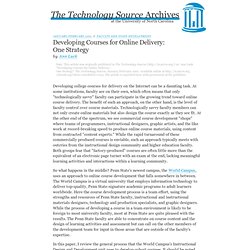
Available online at The article is reprinted here with permission of the publisher. Developing college courses for delivery on the Internet can be a daunting task. At some institutions, faculty are on their own, which often means that only "technologically savvy" faculty can participate in the growing trend toward online course delivery. The benefit of such an approach, on the other hand, is the level of faculty control over course materials. Technologically savvy faculty members can not only create online materials but also design the course exactly as they see fit.
So what happens in the middle? In this paper, I review the general process that the World Campus's Instructional Design and Development unit uses to develop cohort courses. 10 Tips for Effective eLearning. Creating good e-learning.